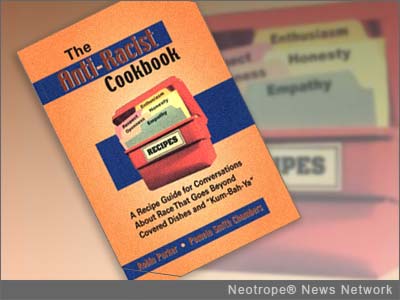 MOUNT LAUREL, N.J. /New York Netwire/ — The Beyond Diversity Resource Center announces publication of a supplement to its book on racial dialogue in America, “The Anti-Racist Cookbook” (ISBN: 978-0971901766). The introduction to the supplement states, “Today, people of color have less to fear from the overt actions of a Ku-Klux-Klan lynch mob than from the implicit bias of a gun-carrying member of a neighborhood watch. Yet, the result may be the same.”
MOUNT LAUREL, N.J. /New York Netwire/ — The Beyond Diversity Resource Center announces publication of a supplement to its book on racial dialogue in America, “The Anti-Racist Cookbook” (ISBN: 978-0971901766). The introduction to the supplement states, “Today, people of color have less to fear from the overt actions of a Ku-Klux-Klan lynch mob than from the implicit bias of a gun-carrying member of a neighborhood watch. Yet, the result may be the same.”
“After George Zimmerman was found not guilty of manslaughter charges in the killing of Trayvon Martin, President Obama asked Americans to have thoughtful conversations about race and its impact on our lives,” noted Robin Parker, the executive director of the Beyond Diversity Resource Center.
“In response, the Center thought it was important to offer supplemental questions to our 2005 publication, ‘The Anti-Racist Cookbook: A Recipe Guide for Conversations about Race That Goes beyond Covered Dishes and Kum-Bah-Ya.’ The questions in the Supplement focus on implicit bias and personal safety, two areas where racial dialogue is especially needed,” adds Parker.
In 2005, the Center published “The Anti-Racist Cookbook” to inspire ordinary people in their communities to have conversations about race in America.
But Parker says conversations about race may be even more necessary now than they were when the book was published: “We’ve made progress on race, but racial issues still fester today. From Imus’ shocking comment about the Rutgers women’s basketball team to Riley Cooper’s and Michael Richards’ use of the N-word, we seem to be experiencing a time when individuals feel justified in making negative racial comments and blaming any damage those comments cause on people who are ‘too sensitive’ or who ‘take the comments the wrong way.'”
According to Parker, these acts are examples of what happens when implicit bias-the unconscious bias people have-comes to the surface, often at times of anger, frustration and fear. Implicit bias, if unaddressed, can be as damaging as overt acts of racism.
“We saw implicit bias played out when the ‘dangerous-young-black-man-wearing-a-hoodie’ stereotype came to national attention after the shooting of Trayvon Martin,” Parker remarked. “Studies like the Harvard’s ‘Project Implicit’ show that Americans have implicit biases against blacks and other marginalized groups. Because the Trayvon Martin incident shows how implicit bias can have fatal consequences, many people of color-especially young people of color-feel unsafe. We need to have dialogue among ordinary people to begin to heal these problems.”
The 2013 Supplement asks questions about current racial issues that include: (1) how people can address their own racial biases, (2) what organizations can do to combat implicit bias, (3) whether people feel safe in light of recent racial incidents, and (4) how we should craft solutions for racial healing. The supplement is now available to people who order “The Anti-Racist Cookbook” from the publisher, Crandall, Dostie & Douglass Books.
To order “The Anti-Racist Cookbook” with the 2013 Supplement, visit http://www.cddbooks.com/ or call (908) 241-5439.
About The Beyond Diversity Resource Center:
The Beyond Diversity Resource Center is a 501(c)3 nonprofit organization that works to build a society that sincerely honors individuals because of their cultural differences. The Center provides comprehensive training and education for those who work together to improve the quality of interactions among persons who are different from one another. More information: http://www.beyonddiversity.org/ .
Copyright © 2013 New York Netwire™ and Neotrope®. NewYorkNetwire™ is a news publication of the Neotrope News Network and a trademark of Neotrope – all rights reserved. NEWS SOURCE: Beyond Diversity Resource Center






